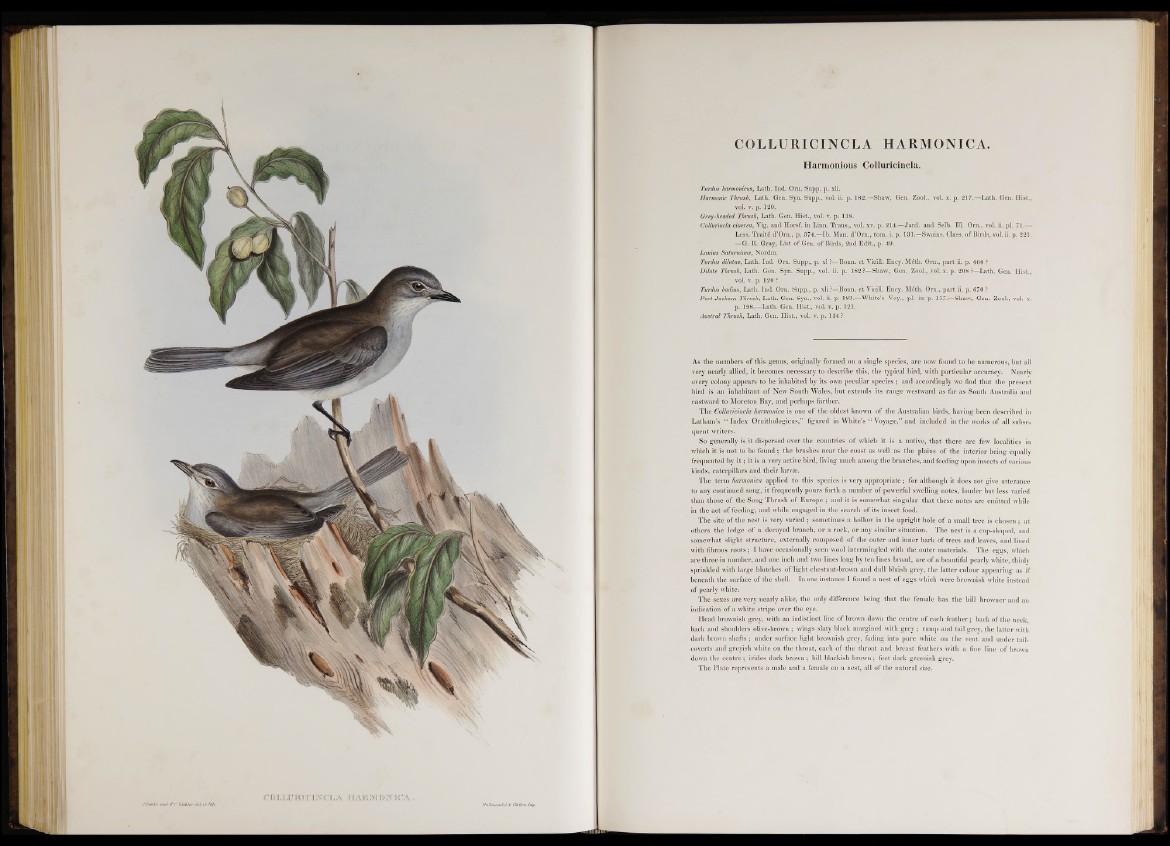
COLLURICINCLA HARMONICA.
Harmonious Colluricincla.
Turdus harmonicus, Lath. Ind. Ora. Supp. p. xli.
Harmonic Thrush, Lath. Gen. Syn. Supp., t o I . ii. p. 182.—Shaw, Gen. Zool., vol. x. p. 217.—Lath. Gen. Hist.,
vol. v. p. 120.
Grey-headed Thrush, Lath. Gen. Hist., vol. v. p. 118.
Collurincla cinerea, Vig. and Horsf. in Linn. Trans., vol. xv. p. 214.—Jard. and Selb. 111. Ora., vol. ii. pi. 71.—
Less. Traité d’Om., p. 374.—lb. Man. d’Ora., tom. i. p. 131.—Swains. Class, of Birds, vol. ii. p. 221.
—G. R. Gray, List of Gen. of Birds, 2nd Edit., p, 49.
Lanius Sat ¡(minus, Nordm.
Turdus dilutus, Lath. Ind. Orn. Supp., p. xl ?—Bonn, et Vieill. Ency. Méth. Ora., p art ii. p. 660 ?
Dilute Thrush, Lath. Gen. Syn. Supp., vol. ii. p. 182 ?—Shaw, Gen. Zool., vol. x. p. 208 ?—Lath. Gen. Hist.,
vol. v. p. 120 ?
Turdus badius, Lath. Ind. Ora. Supp., p. xlip||Bonn. et Vieill. Ency. Méth. Orn., part ii. p. 670 ?
Port Jackson 'Thrush, Lath. Gen. Syn., vol. ii. p. 183.—White’s Voy., pi. in p. 157.—Shaw, Gen. Zool., vol. x.
p. 198.—Lath. Gen. Hist., vol. v. p. 121.
Austral Thrush, Lath. Gen. Hist., vol. v. p. 124?
As the members of this genus, originally formed on a single species, are now found to be numerous, but all
very nearly allied, it becomes necessary to describe this, the typical bird, with particular accuracy. Nearly
every colony appears to be inhabited by its own peculiar species ; and accordingly we find that the present
bird is an inhabitant of New South Wales, but extends its range westward as far as South Australia and
eastward to Moreton Bay, and perhaps farther.
The Colluricincla harmonica is one o f the oldest known o f the Australian birds, having been described in
Latham’s “ Index Ornithologicus,” figured in White’s “ Voyage,” and included in the works of all subsequent
writers.
So generally is it dispersed over the countries of which it is a native, that there are few localities in
which it is not to be found; the brushes near the coast as well as the plains o f the interior being equally
frequented by i t ; it is a very active bird, living much among the branches, and feeding upon insects o f various
kinds, caterpillars and their larvae.
The term harmonica applied to this species is very appropriate; for although it does not give utterance
to any continued song, it frequently pours forth a number of powerful swelling notes, louder but less varied
than those o f the Song Thrush o f Europe ; and it is somewhat singular that these notes are emitted while
in the act of feeding, and while engaged in the search of its insect food.
The site o f the nest is very varied ; sometimes a hollow in the upright bole o f a small tree is chosen; at
others the ledge o f a decayed branch, or a rock, or any similar situation. The nest is a cup-shaped, and
somewhat slight structure, externally composed o f the outer and inner bark o f trees and leaves, and lined
with fibrous roots; I have occasionally seen wool intermingled with the outer materials. The eggs, which
are three in number, and one inch and two lines long by ten lines broad, are o f a beautiful pearly white, thinly
sprinkled with large blotches of'light chestnut-brown and dull bluish grey, the latter colour appearing as if
beneath the surface o f the shell. In one instance I found a nest o f eggs which were brownish white instead
of pearly white.
The sexes are very nearly alike, the only difference being that the female has the bill browner and an
indication of a white stripe over the eye.
Head brownish grey, with an indistinct line o f brown down the centre of each feather; back o f the neck,
back and shoulders olive-brown ; wings slaty black margined with g rey; rump and tail grey, the latter with
dark brown shafts; under surface light brownish grey, fading into pure white on the vent and under tail-
coverts and greyish white on the throat, each of the throat and breast feathers with a fine line of brown
down the centre; irides dark brown; l)ill blackish brown; feet dark greenish grey.
The Plate represents a male and a female on a nest, all of the natural size.